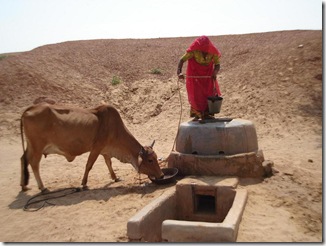In the remote reaches of the Thar Desert, where the bustle and noise of Rajasthan's blue hued city of Jodhpur fades and disappears into the sand, far beyond the sandstone mines at the outskirts of the city, Gramin Vikas Vigyan Samiti, a.k.a. GRAVIS, and otherwise known as Center of People's Science for Rural Development, is hard at work. From opium addiction to food insecurity, from maternal and child mortality to lack of access to drinking water, GRAVIS addresses a broad spectrum of challenges and works with communities to find solutions.
 We are blessed with the opportunity to get to know GRAVIS through the eyes of its co-founder, Shashi Tyagi, who alongside her late husband, has worked since 1981 to create an entity that now reaches 900 remote village communities throughout Rajasthan and beyond. GRAVIS addresses health education and literacy with a special emphasis on girls; facilitates agriculture, water conservation, forestry, and animal husbandry projects; advocates for the elderly and women and children; and provides emergency assistance in times of catastrophe. It does all of this via a community-based, holistic approach rooted deeply in the Gandhian principles of Sarvodaya, which means “all rising, but the last person's first” and Gram Swarajya, or village self-rule.
We are blessed with the opportunity to get to know GRAVIS through the eyes of its co-founder, Shashi Tyagi, who alongside her late husband, has worked since 1981 to create an entity that now reaches 900 remote village communities throughout Rajasthan and beyond. GRAVIS addresses health education and literacy with a special emphasis on girls; facilitates agriculture, water conservation, forestry, and animal husbandry projects; advocates for the elderly and women and children; and provides emergency assistance in times of catastrophe. It does all of this via a community-based, holistic approach rooted deeply in the Gandhian principles of Sarvodaya, which means “all rising, but the last person's first” and Gram Swarajya, or village self-rule.Our group of 14 mounted our trusty bus an d headed off to visit one of GRAVIS's rural training centers about 90 minutes outside Jodhpur. Along the way we put into practice our now well honed bus riding skills, effortlessly surfing the bun-lifting bumps in the road and simultaneously engaging in a rigorous Q & A session with Shashi-Ji about GRAVIS. Upon our arrival at the center (the final section of which was traversed on foot as it was deemed too treacherous for the bus), we were served yet another in what is becoming a long line of memorably delicious lunches, this one featuring a dish that rapidly landed the latest top spot in our culinary explorations. It was a local specialty made using from the sacred khejri (not to overlook the ample, hot rice pudding and fresh roti made from millet flour).
With happy hearts and full bellies, the group divided in two in order to indulge our respective interests. Some of us ventured even deeper into the Thar to see some real traditional rainwater harvesting in action, while others toured the training center to witness what is known as the Masala Project in action.
A burly safari jeep ride into the desert landed the rainwater harvesting crew at a place that felt outside of time, a desert homestead. We were greeted in no time by the curious residents and after introducing ourselves launched into a lively chat about the traditional rainwater harvesting method we were standing on, known as a khadin.
The purpose of a khadin is to promote and retain soil moisture in an agricultural area. A wall-like, masonry structure one to two meters high is constructed at the downstream portion of a natural watershed to prevent water and topspoil from flowing out of the small valley while allowing excess water to overflow. Khadins can be constructed in series, promoting infiltration and topsoil retention on multiple sequential agricultural plots. Simple and elegant, khadins significantly increase the fertility of arable land as well as raise the water table. The family reported that their beri, or traditional percolation well (see photo below), has provided significantly more water since the khadin was constructed and they are now able to share water with their neighbors.
We were delighted to explore and ask questions about our first encounter with traditional rainwater harvesting, as well as to cuddle with a flock of 15 day-old baby sheep the children were proud to share with us. GRAVIS supports the construction of khadins, as well as taankas (passive underground water storage tanks) and nadis (community ponds) in desert communities throughout Rajasthan, which has a massive positive impact on the people living in these rain-starved regions. Women are particularly affected, since the work of collecting water for all the family's needs falls to them and often involves treks over vast kilometers and hours spent away from home.
Meanwhile, back at the training center, it was all about the spice. Cumin, corriander, tumeric, and chili are processed by local women to sell at market, with infrastructure for processing and business support from GRAVIS. The Masala Project provides women with an economic opportunity in a region with very few options for women in business.
Our time with GRAVIS came to a climactic end when a dance party, complete with live local musicians, spontaneously erupted and both WEA women and new mothers attending a maternal and child health education course shook it with all their hearts and souls on the improvised dance floor, leaving not a doubt in anyone's mind as to who the real Spice Girls are.
 Blue Baldwin currently resides in her home town of Tucson, AZ where rapid population growth and limited water resources are creating exciting opportunities for innovative and holistic resource management practices. She works with Watershed Management Group, a non-profit organization that works collaboratively with government entities and empowers communities in Tucson and around the world to address issues of water management, food security, and sanitation through hands-on, action-oriented, community-based projects utilizing locally available knowledge and resources. After working as a Senior Research Specialist in Ophthalmology, Blue received her Master's Degree in International Public Health from the University of Arizona and completed her thesis investigating water and sanitation issues and organizing community health care providers in rural villages in Nicaragua. During her time in graduate school, the inextricable relationship between human and environmental health became her primary fixation. She has found her passion and her niche in the world of sustainability and has worked in the fields of natural building materials, socially responsible investing, and water harvesting. Blue strives to be joyfully furious and furiously productive in response to the current state of industrialized agriculture and the privatization of water around the world.
Blue Baldwin currently resides in her home town of Tucson, AZ where rapid population growth and limited water resources are creating exciting opportunities for innovative and holistic resource management practices. She works with Watershed Management Group, a non-profit organization that works collaboratively with government entities and empowers communities in Tucson and around the world to address issues of water management, food security, and sanitation through hands-on, action-oriented, community-based projects utilizing locally available knowledge and resources. After working as a Senior Research Specialist in Ophthalmology, Blue received her Master's Degree in International Public Health from the University of Arizona and completed her thesis investigating water and sanitation issues and organizing community health care providers in rural villages in Nicaragua. During her time in graduate school, the inextricable relationship between human and environmental health became her primary fixation. She has found her passion and her niche in the world of sustainability and has worked in the fields of natural building materials, socially responsible investing, and water harvesting. Blue strives to be joyfully furious and furiously productive in response to the current state of industrialized agriculture and the privatization of water around the world. This is part of a series entitled From The Fields which follows WEA's Women and Agriculture delegation on their 10 day journey through Northern India. Read more about this initiative here.
Photo of Shashi Tyagi, courtesy of http://www.worldculture.org/biographies/bios-pdf/Shashi%20Tyagi%20of%20GRAVIS.pdf





















